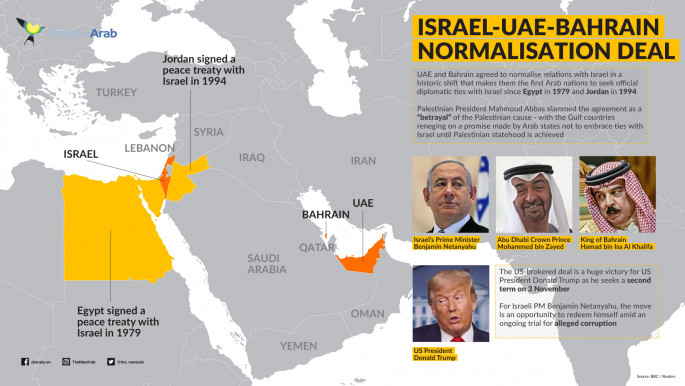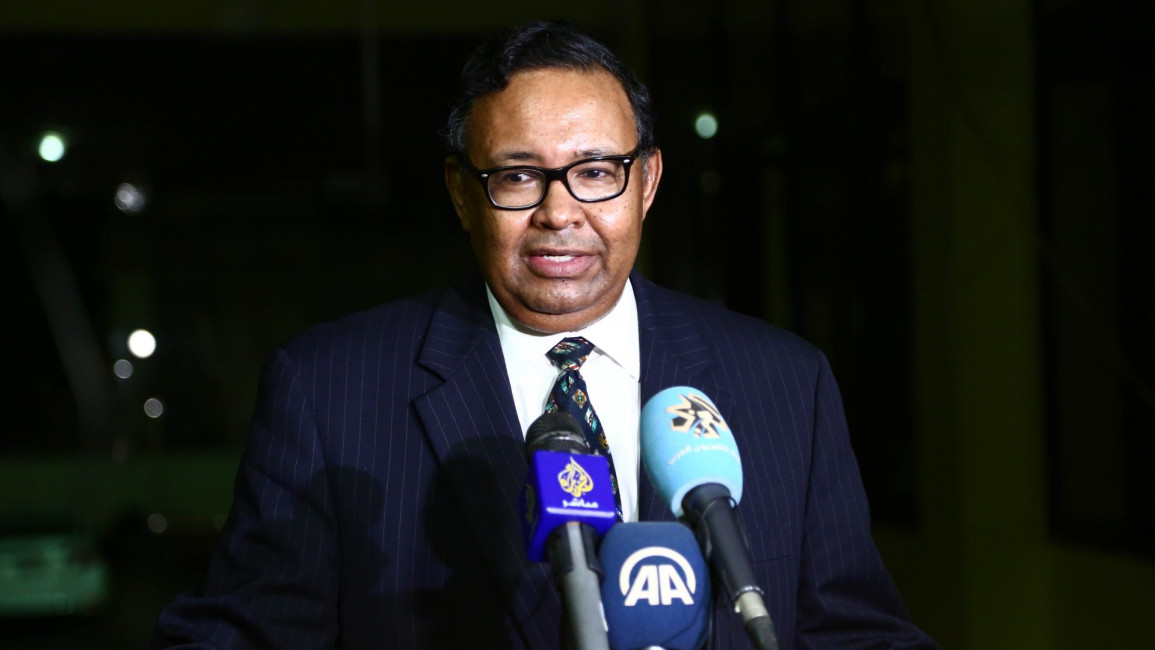Sudan fires ministry spokesman after Israel normalisation comments
Sudan fires ministry spokesman after Israel normalisation comments
A series of pro-normalisation comments from a since-fired Sudanese foreign ministry spokesperson have been denied by officials, who insist no talks with Israel are underway.
3 min read
The former spokesman has urged officials to reveal their 'secret talks with Israel' [Getty]
Sudan's foreign ministry denied the possibility of normalised relations with Israel after a now-fired spokesperson for the ministry said it was "looking forward" to a peace agreement.
In a series of comments on Tuesday, ministry spokesman Haydar Badawi Sadig praised last week's normalisation agreement between Israel and the United Arab Emirates as a "brave" step.
Khartoum was in talks with Israel and keen to move forward with a normalisation deal of its own, Sadig told Reuters and regional media.
The Sudanese foreign ministry later refuted the comments, saying it had learned of Sadig's statements with "astonishment".
"The Ministry of Foreign Affairs of the Republic of Sudan confirms that the issue of relations with Israel was not discussed in the Ministry of Foreign Affairs in any way, and Ambassador Haydar Badawi (Sadig) was not assigned to make any statements in this regard," the ministry said in a statement.
The spokesman later told a televised press conference that his statements were a representation of his "personal opinion as a free Sudanese citizen".
The foreign ministry said on Wednesday it had fired Sadig following the alleged mix-up.
However, his comments come just months after the leader of Sudan's transitional sovereign council met with Israeli Prime Minister Benjamin Netanyahu in Uganda.
The Israeli premier's office described the February meeting with General Abdel Fattah al-Burhan as a first step towards "normalising ties" at the time.
The sovereign council leader, however, said the meeting came out of a personal initiative to "protect the national security of Sudan".
Amid fierce public anger, a government spokesperson said Burhan had given no promises of "normalising or having diplomatic relations" with Israel.
Speaking to The New Arab's Arabic-language sister site, spokesman Faisal Mohammed Saleh reitirated that statement on Wednesday.
Sadig has only doubled down his comments, however.
In a post attributed to the former spokesman on the Sudanese Online forum, Sadig urged the government to "respect your people" and reveal "what is going on in secret about its relationship with Israel".
"I will not let my position at the foreign ministry or the old, prevailing and outdated notions of diplomacy, with the art of concealment or flowery revelation, stop me from expressing my free opinion on any matter of public interest," he wrote.
Observers have linked a possible normalisation deal between Sudan and Israel with Khartoum's removal from the US State Sponsors of Terrorism list, a designation that subjects Sudan to sanctions and limits international aid to its ravaged economy.
In a series of comments on Tuesday, ministry spokesman Haydar Badawi Sadig praised last week's normalisation agreement between Israel and the United Arab Emirates as a "brave" step.
Khartoum was in talks with Israel and keen to move forward with a normalisation deal of its own, Sadig told Reuters and regional media.
The Sudanese foreign ministry later refuted the comments, saying it had learned of Sadig's statements with "astonishment".
"The Ministry of Foreign Affairs of the Republic of Sudan confirms that the issue of relations with Israel was not discussed in the Ministry of Foreign Affairs in any way, and Ambassador Haydar Badawi (Sadig) was not assigned to make any statements in this regard," the ministry said in a statement.
The spokesman later told a televised press conference that his statements were a representation of his "personal opinion as a free Sudanese citizen".
The foreign ministry said on Wednesday it had fired Sadig following the alleged mix-up.
|
|
However, his comments come just months after the leader of Sudan's transitional sovereign council met with Israeli Prime Minister Benjamin Netanyahu in Uganda.
The Israeli premier's office described the February meeting with General Abdel Fattah al-Burhan as a first step towards "normalising ties" at the time.
The sovereign council leader, however, said the meeting came out of a personal initiative to "protect the national security of Sudan".
Amid fierce public anger, a government spokesperson said Burhan had given no promises of "normalising or having diplomatic relations" with Israel.
Speaking to The New Arab's Arabic-language sister site, spokesman Faisal Mohammed Saleh reitirated that statement on Wednesday.
Sadig has only doubled down his comments, however.
In a post attributed to the former spokesman on the Sudanese Online forum, Sadig urged the government to "respect your people" and reveal "what is going on in secret about its relationship with Israel".
"I will not let my position at the foreign ministry or the old, prevailing and outdated notions of diplomacy, with the art of concealment or flowery revelation, stop me from expressing my free opinion on any matter of public interest," he wrote.
Observers have linked a possible normalisation deal between Sudan and Israel with Khartoum's removal from the US State Sponsors of Terrorism list, a designation that subjects Sudan to sanctions and limits international aid to its ravaged economy.

Follow us on Facebook, Twitter and Instagram to stay connected



